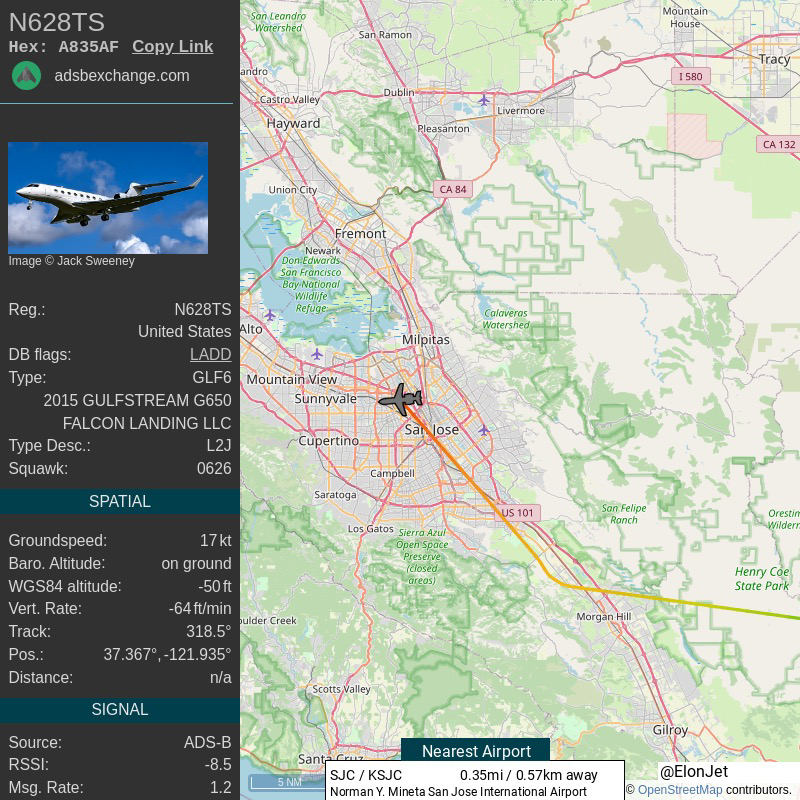Elon Musk certainly dominates headlines. Since first announcing plans to, perhaps, buy Twitter, maybe, back in April, he’s remained unavoidable in the tech, media, and business press. Yet, Musk avoids good press, seemingly no matter what it costs him.
Musk is polarizing; he and his companies merit scrutiny and will earn criticism from watchdogs. But car fires, racism within Musk’s companies, refusing to pay bills, and even offering an employee a horse for a handjob is not why I say Musk is bad at PR. Take a look at ElonJet.
Musk Avoids Good Press Example: The ElonJet Saga Begins
ElonJet was one of several Twitter accounts created by Jack Sweeney that tracked the location of private jets. Sweeney created simple bots parsing data from the FAA and the ADS-B Exchange to publish the flight paths of over a dozen private jets . All of this data is public, and most of it is required by law for planes to fly.
Musk seemed very worried about this data being shared, even sending Sweeney a Twitter DM asking him to take the account down. Musk was willing to pay $5,000 to have the account removed. Sweeney, who was 19-years-old at the time, offered to take the account down in exchange for an internship at Tesla.
Sweeney had a part-time job at UberJets as a developer due to the skills he demonstrated in making these Twitter accounts. The young man getting an internship at Tesla was neither unreasonable nor much effort for Musk to set up. But, again, Elon Musk avoids good press at all costs.
The Good Press That Musk Could Have Gotten
The full #elonjet story could have ended with Musk giving a clearly bright young man an internship and a photo op. The Musk and Sweeney story would have been compared to 12-year-old Steve Jobs cold-calling Bill Hewlett of Hewlett-Packard and landing a summer gig. It was a setup for a feel-good story and fawning media coverage.
I’m really cynical, and I cannot think of a truly negative angle to have covered Musk giving the ElonJet guy the position. A few essays about how Sweeney benefited from privilege aside, the press from ABC to ZDNet would have been positive. It was the PR equivalent of a softball question.
Musk got handed an absolute PR win but didn’t take it. The ElonJet account stayed on Twitter, and from January 1, to December 11, I found no evidence of any report to law enforcement that Musk was being stalked at or around airports. I thought it possible Musk determined the account wasn’t much of a security risk; I was wrong.
The PR Worst-case Scenario That Was
After buying Twitter, Musk ended up choosing the PR worst-case scenario. On November 7, after taking over management of the social network, Musk said his “commitment to free speech extends even to not banning the account following my plane.”
Early in December, Sweeney claimed that the account was being suppressed. Sweeny Tweeted a screenshot seemingly showing Slack messages from inside Twitter. The screenshot showed Ella Irwin, a Twitter exec asking her team to “apply heavy VF [visibility filtering]” to the account. The screenshots are unconfirmed by third-party media.
On December 14, Twitter suspended the ElonJet account, despite the prior pledge. The social network brought back the account after imposing a new policy preventing sharing of anyone’s real-time location. The account was suspended again shortly after, and Musk tweeted that a “crazy stalker” attacked a car in Los Angeles carrying his son.
Things That Probably Didn’t Happen
Interestingly, the video Musk shared of the incident didn’t happen near an airport unless you call a hospital helipad an “airport”. Oh, and no report has been filed with the LAPD. According to a statement on December 16, from Officer Lizeth Lomeli, a police public information officer,
“LAPD’s Threat Management Unit is aware of the situation and tweet by Elon Musk and is in contact with his representatives and security team. No crime reports have been filed yet,”.
Musk Fan’s Say Butwhatabout
Inconsistencies of Musk’s story don’t stop many Musk fans saying ElonJet is doxxing. Suggesting that sharing the physical location of someone’s private jet based on public data isn’t doxxing causes a ruckus in the peanut gallery. Many people repeat Musk’s own claim that ElonJet was sharing his “real-time location”. Others ask if it would be doxing to share your location and post that on Twitter.
Musk’s aircraft is either at an airport, or in the air and inaccessible. The real-time location of a plane in the air or the airport it is parked pose very little ground security risk. Reductio ad absurdum of someone sharing FAA flight data on Twitter, is not a government agency keeping records of everyone’s real time GPS location that someone is Tweeting.
And Who Would’ve Thought, It Figures
Creating a new policy in response to a logically-inconsistent story of security risk after explicitly saying you wouldn’t remove an account is optically worse than giving a gifted teen an internship. But this is Musk; he can make more self-destructive PR choices.
Twitter started suspending prominent accounts. Reportedly for linking to ElonJet on other websites (only true in some cases). The accounts suspended include Linette Lopez, Keith Olbermann, Ryan Mac, Aaron Rupar, Steve Herman, Drew Harwell, Donie O’Sullivan, Matt Binder, Tony Webster, Micah Lee, among many others. Ban a bunch of reporters and generate a bunch of bad reports, as the kids say.
The real kicker to all of this; The backdrop of Musk spending the last few weeks promoting the Twitter Files. Spending weeks claiming prior management of the company you now own engaged in petty and political suppression and banning of accounts before doing the same in spades is enough to make Alanis Morissette combust spontaneously.
Mason Pelt is the Managing Director of Push ROI. Originally published at https://pushroi.com on December 16, 2022.




